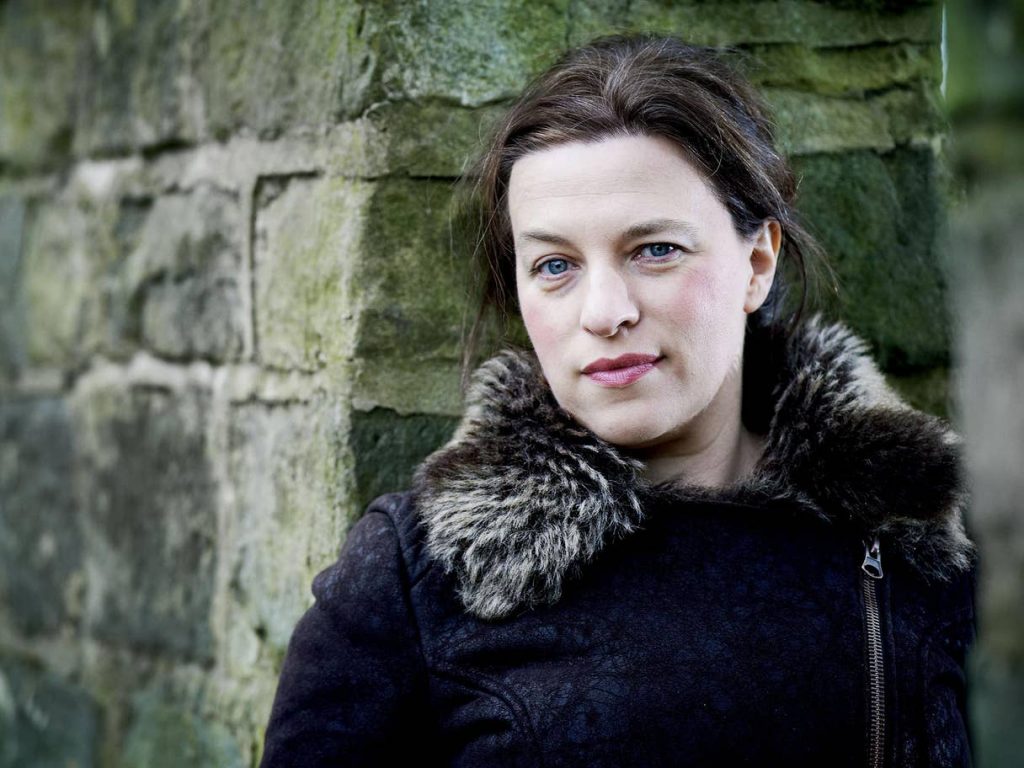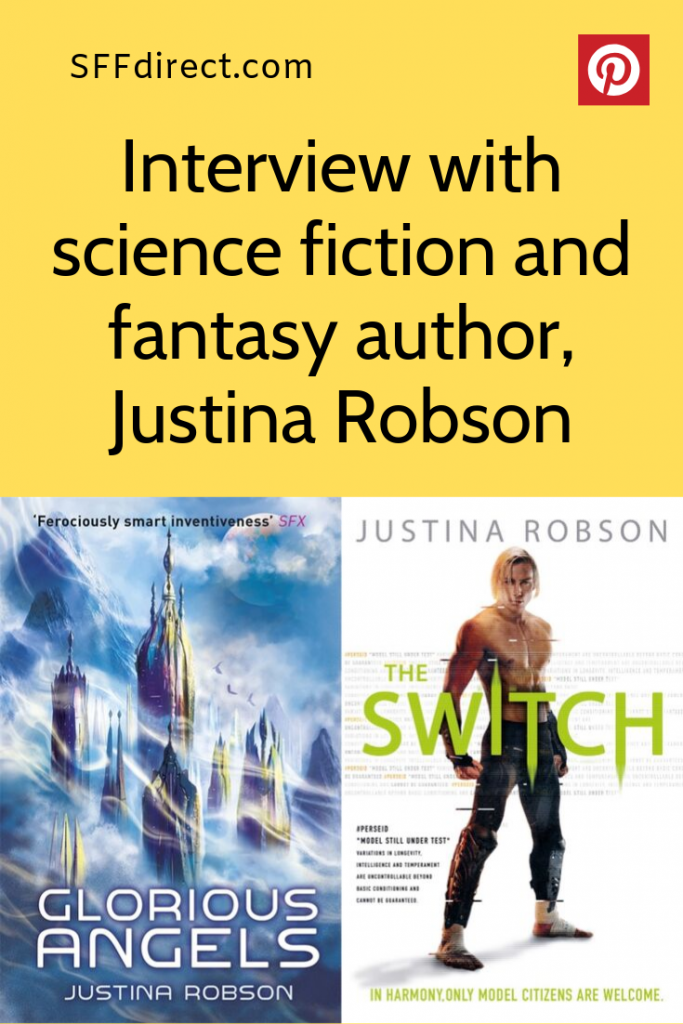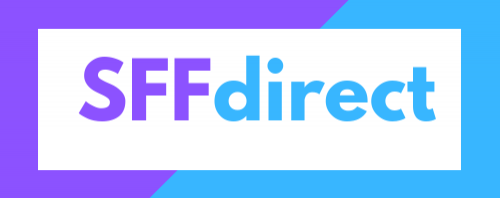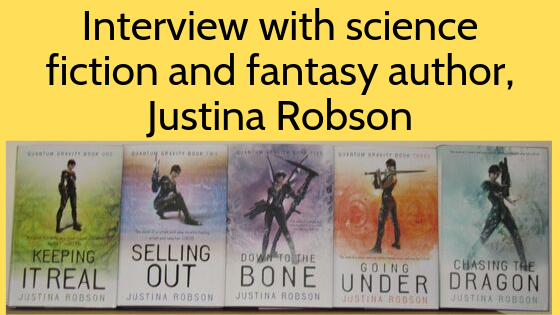SFFdirect met Justina Robson for interview on 25 September in Leeds. Justina was very open and frank, and it was great to hear about her work and her experiences as a writer. I was struck by how down to earth and self-effacing she is.

Justina lives in Leeds, UK. She is a highly successful author and member of the science fiction and fantasy (SFF) community. She has fourteen published novels to her name, all with Gollancz, and a swathe of short fiction. She’s well known for her Quantum Gravity series of novels. Her most recent novel is Salvation’s Fire; this is the second book in the After the War series, the first of which was written by Adrian Tchaikovsky. (See his interview with SFFdirect here). Prior to that she wrote The Switch. This follows Nico, a boy slated for eradication, in a world where only model citizens are welcome.
Achievements
Justina’s Patreon page lists a number of her main achievements. These include (in her words):
- Winner of the 2000 Amazon.co.uk Writers’ Bursary (and a massive Orcish ice-hockey puck on my desk to prove it).
- Member of the Science Fiction Advisory Council to the X-Prize.
- Judge for the Arthur C Clarke Award (2005) for the Science Fiction Foundation.
- Host and presenter of the Hugo awards in 2014, with Geoff Ryman.
- Worked on the lore and legends at Hasbro for The Transformers (Prime Continuum) to create The Covenant of Primus.
- An alumna of the rightly notorious Clarion West writers’ boot camp (class of ’96).
In the article that follows I have paraphrased Justina’s answers.
What are you working on currently?
I’m writing a novella called Paper Hearts in which an AI takes over the world. This is for the Robot Dreams series of novellas by NewCon Press. This will probably be out around Spring next year. I struggled with it because I couldn’t find the right way to tell the story to make it plausible and readable. But I found a way through reading the entries for the James White Award, for which I’m a judge this year. The answer lay in structure and time. I’d been trying to write a linear narrative but I now know I need to break it up non-chronologically.
After Paper Hearts I will continue writing another project I’ve had on the back burner. The working title is Foxy and Tiggs and the Palantir Codex. It’s a humorous SF novella which follows the eponymous heroes, a fox and velociraptor. They are far future wildlife rangers and they solve mysteries.
After the novellas, I’m going to start a new project, working title: Hellburner. This has been in the back of my mind for a long time. It’s an urban fantasy about a seance where two demons come through, one of which hunts the other. My working models for it are House of Leaves (Danielewski) and Kraken (Mieville), so, maybe not quite the usual urban fantasy. It’s had a few incarnations so far as a story, none of which quite work, so third time the charm, I hope.
In addition to the above, I am currently re-releasing the Quantum Gravity series in the US. I am doing this by the self-publishing route and consequently I have had to learn a lot about self-publishing.
Have you always written?
Yes, I started writing stories aged six or seven. I started with ghost stories and animal fables. I loved to read and became interested in science fiction and fantasy as a teenager, reading authors like Rosemary Sutcliff, Diana Wynne Jones and Anne McCaffrey. Later, I read my dad’s science fiction books, for example Arthur C Clarke and Aldous Huxley, but I leaned more toward fantasy or SF which was like fantasy, rather than hard SF.
Even as a teenager, I knew I wanted to write as a career. I did Classics at school and loved the stories e.g. The Odyssey and The Iliad. At university I studied Philosophy and Linguistics. After university I worked as a secretary and then as a fitness instructor, teaching yoga in the 90’s yoga craze, but I always wrote on evenings and weekends all the way through.
How did you first get involved in the science fiction and fantasy community?
I did some Arvon courses around 1991 or 1992 onwards and the teachers told me about fandom and conventions. The first convention I attended was Mexicon in Scarborough and it was like going to God’s Palace! I met many successful authors and learned about the BSFA and the BFS, both of which I joined right away.
What was your first publication?
It was a horror story called Tresor, published in The Third Alternative magazine in 1994. This is the magazine which became Black Static.
What was your journey to publication like?
I got an agent in 1994 or 1995 through going to a convention. I’d written a fantasy trilogy and was looking for representation. However, I did all the things you should never do. For example, I turned up to the convention with all three novels printed out on A4 in lever arch files, and I gave them to HarperCollins editor, as she was then, Jane Johnson (now a celebrated author in her own right). Luckily she accepted them and they were eventually passed to John Parker at MBA, who took me on.
The fantasy trilogy was never published. I was told it was too ambitious and I see now that it was true. Years passed and I wondered if I would ever get a novel published. Then I attended an Arvon course and during the classes I told a quick little story about a woman who has a best friend but doesn’t know she’s a robot. The class really liked it, so I decided to make it into a novel. This was Silver Screen, my first published novel, released in 1999. Writing it was a struggle though and I was quite depressed by that point. At first the story didn’t work but I changed it from distant 3rd person point of view to close third person POV and it then fell into place. The new voice enabled it to become more chatty and confessional, and that was the key.
I’ve noticed that a lot of your work is about the body and the future of humanity. Is that something you’re particularly interested in?
Definitely. In my fiction, I love to take ideas about technology and blend them with realistic situations and characters. In particular this includes how advances in nanoscience, artificial intelligence and biotechnology might affect how humans change or use their bodies in the future. I’ve only ever seen this done spectacularly well in James Tiptree Junior’s (Alice Sheldon’s) work, for example Love is the Plan. The Plan is Death.
By my 30s the reality of being a biological female human was weighing heavily on me. For example issues of equality, feminism, but most of all about the way you are hostage to your biology. You cannot escape it. As a child I never felt girlish but as a woman I felt it strongly that I was a woman and I was almost offended by it – as if I had been kidnapped. I’ve noticed that even the way I think and feel is driven by biology and it takes away your autonomy, or reveals that as a fantasy. We can ask, “Does anyone have any autonomy? What happens to choice?” On a related matter, I have read articles in which scientists state that your decisions are made in the brain before you are consciously aware of making them. This is all fascinating stuff.
Much of your work includes both magic and science/technology i.e. it blends fantasy and science fiction. Can you tell us about this?
As a child I had no awareness that people separate genres, and particularly that they separate fantasy and science fiction. And I have never understood the strong separation. There is no reason that fantasy and science fiction cannot coexist. The only difference I see between fantasy and science fiction is that fantasy tends to be more comforting and SF tends to be more disturbing. Nevertheless, I like to meld them.
Is spirituality and mysticism important to you?
I find myself overwhelmed these days. There’s so much to know and we can’t even see the limits of what we don’t know. We have to accept this, which is why I keep going back to mysticism. My work, even in the Quantum Gravity books, always goes back to the experience of you as a living being. And I’ve had an interest in philosophy from my university days. I have studied and taught yoga and for a number of years now, I’ve been listening to the Indian yogi, Sadhguru. When he speaks, he is insightful and absolutely clear. Not just on yoga but on life. I connect with his teachings more than I do Western philosophy.
Do you see yourself primarily as a novelist or as a short story or novella writer?
Definitely a novelist. I naturally tend towards the novel. I only write short stories now if I am asked to write them. I’m quite a slow writer so I often have to say no. It was at Clarion West that I learnt how to write the short story form.
I actually think that science fiction suits the shorter form best i.e. anything up to novella length. The ideas in innovative SF are complicated, and are best done concisely. Shorter works have more impact, and don’t get bogged down in irrelevance. But the SF of ideas is different to the SF of the adventure story. The former is more suited to the shorter form, and the latter to novel-length fiction. The latter are character-driven stories rather than innovative and that’s ok – there is a place for everything.
How long do you normally take from having an idea to starting to write?
Ideas take time to bake in your head. Your brain is always working on it and it can be years while an idea waits on the back burner. Some of them time-out after a while, if they’re no longer relevant or no longer excite you. I have to be absolutely gripped by the idea in order to write the novel. After all, you are with the project for a long time so you have to be passionate about it.
Do your ideas normally start with character or plot or something else?
My ideas are usually characters in a predicament, and everything builds out from that.
How much of a planner are you?
I usually have a vague plan. I always know the story arc and the ending. In addition, I write notes one or two chapters ahead as I go.
What is your writing process like?
I don’t have a daily word count goal or anything like that. I try to have a routine but lately I’ve been suffering with depression and anxiety, and also fatigue. Depression is something I’ve always struggled with but lately it’s worse than usual. Consequently, I’m a slow writer at the moment.
I write in the morning, and find that I write best the less things that have happened. For example, if I get up and have breakfast and then immediately sit down and write then I’ll do much better than if I’ve had to take the kids to school, walk the dog and do some shopping first. My other writing slot is from 5 – 9 pm. Ideally, I’d like to do two hours of writing per day.
I have an office at home to work in, which is my preferred space in which to write. I also have a writing shed. Silence is not something I need. Sometimes I put music on, but I forget it’s there once I’m in the zone. I like the first draft stage of writing because it’s fun. Anything can happen. I also like editing, though, because I feel like I’m mastering the text. Recently I’ve started developmental editing services, which I’m charging for.
What was it like being a judge for the Arthur C Clarke Award (in 2005)?
I had to read 70 – 75 books over a space of a few months! The judges met face-to-face twice: once to choose the shortlist and once to select the winner. There was lots of disagreement as you might expect! It was a very interesting and informative experience.
What was it like being the host of the 2014 Hugo Awards with Geoff Ryman?
Terrifying, especially as it was a difficult environment that year with the Sad Puppies campaign and other issues. What made it great was hosting with Geoff. I’ve known him a long time. He was one of my tutors at Clarion West and also at Arvon, and he’s an amazing creative writing teacher.
What advice would you give to a beginning SFF writer?
The publishing landscape is always shifting. If your heart is set on writing, you can learn about marketplaces, figure out where you fit and work towards it. Have a goal in mind and a focus, otherwise you will get overwhelmed. And remember you don’t have to be limited to books. There are other outlets, for example games and comic books.
If you are committed to writing fiction, read read read. Read outside the genre as well as inside it. Don’t be ashamed if you haven’t read the classics, whether genre or non-genre. Be up for a challenge. Stay alert to what’s interesting in the world. You will have to learn a lot, and you have to be a sponge and absorb what you are exposed to. You don’t necessarily need to read newly published books; read what you want. And if you find yourself liking crime novels or romance novels more than SFF, then maybe you should be writing crime or romance.
In addition, make sure you always understand what you are signing. Keep on top of contracts and make sure you can always lay your hands on them easily.
Finally, why do you write science fiction and fantasy as opposed to any other genre?
I find other genres less interesting, with less scope for working with the kinds of ideas I like to examine. SF is like a lab where you can address very real and serious issues. Fantasy is a truer representation of human psychology. The things that drive you can have physical representation – gods, demons, monsters. That is very primal and universal. Stories are the way we understand the world. Limiting yourself to representations of external reality misses it.
SFFdirect would like to thank Justina Robson very much for her time. We wish her all the best with her upcoming titles. Please let us know your thoughts in the comments below!


